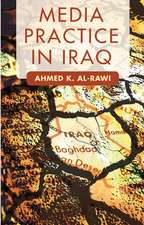Movies & Mass Culture: Rutgers Depth of Field Series
Autor John Beltonen Limba Engleză Paperback – oct 1995
Movies and Mass Culture looks at the ways in which American identity shapes and is shaped by motion pictures. Movies serve not only as texts that document who we think we are or were, but they also reflect changes in our self-image, tracing the transformation from one kind of America to another. They assist audiences in negotiating major changes in identity, carrying them across difficult periods of cultural transition so that a more or less coherent national identity again emerges. Films thus help their viewers to span the gaps and fissures that cultural changes cause, allowing passage over any disjointedness that in some way might disrupt our sense of what we believe in as a nation. This volume examines this process, illustrating the ways in which films aided America's transition from an agrarian to an industrial economy; from a nation of producers to one of consumers; and from a community of individuals to a mass society.
Preț: 282.95 lei
Nou
Puncte Express: 424
Preț estimativ în valută:
54.16€ • 56.33$ • 45.38£
54.16€ • 56.33$ • 45.38£
Carte tipărită la comandă
Livrare economică 14-28 martie
Preluare comenzi: 021 569.72.76
Specificații
ISBN-13: 9780813522289
ISBN-10: 0813522285
Pagini: 279
Dimensiuni: 152 x 229 x 15 mm
Greutate: 0.4 kg
Ediția:None
Editura: Rutgers University Press
Colecția Rutgers University Press
Seria Rutgers Depth of Field Series
ISBN-10: 0813522285
Pagini: 279
Dimensiuni: 152 x 229 x 15 mm
Greutate: 0.4 kg
Ediția:None
Editura: Rutgers University Press
Colecția Rutgers University Press
Seria Rutgers Depth of Field Series
Notă biografică
JOHN BELTON is a professor of English at Rutgers University and author of Widescreen Cinema and American Cinema/American Culture.
Cuprins
Introduction
Mass Culture, the Individual, and the Mass
Apocalyptic Cinema: D. W. Griffith and the Aesthetics of Reform
The Crowd, the Collective, and the Chorus: Busby Berkeley and the New Deal
The Regulation of Desire: From Mass Consumption to Mass Morality
The Carole Lombard in Macy's Window
The Economy of Desire: The Commodity Form in/of the Cinema
The Production Code
The Dark Side of Mass Culture: Film Noir
Notes on Film Noir
Woman's Place: The Absent Family of Film Noir
Mass Production, the Failure of the New, and Reaganite Cinema
Postmodernism and Consumer Society
Papering the Cracks: Fantasy and Ideology in the Reagan Era
Against the Grain
New U.S. Black Cinema
The Oppositional Gaze: Black Female Spectators
Select Bibliography
Contributors
Index
Mass Culture, the Individual, and the Mass
Apocalyptic Cinema: D. W. Griffith and the Aesthetics of Reform
The Crowd, the Collective, and the Chorus: Busby Berkeley and the New Deal
The Regulation of Desire: From Mass Consumption to Mass Morality
The Carole Lombard in Macy's Window
The Economy of Desire: The Commodity Form in/of the Cinema
The Production Code
The Dark Side of Mass Culture: Film Noir
Notes on Film Noir
Woman's Place: The Absent Family of Film Noir
Mass Production, the Failure of the New, and Reaganite Cinema
Postmodernism and Consumer Society
Papering the Cracks: Fantasy and Ideology in the Reagan Era
Against the Grain
New U.S. Black Cinema
The Oppositional Gaze: Black Female Spectators
Select Bibliography
Contributors
Index
Descriere
Movies and Mass Culture looks at the ways in which American identity shapes and is shaped by motion pictures. Movies serve not only as texts that document who we think we are or were, but they also reflect changes in our self-image, tracing the transformation from one kind of America to another. They assist audiences in negotiating major changes in identity, carrying them across difficult periods of cultural transition so that a more or less coherent national identity again emerges. Films thus help their viewers to span the gaps and fissures that cultural changes cause, allowing passage over any disjointedness that in some way might disrupt our sense of what we believe in as a nation. This volume examines this process, illustrating the ways in which films aided America's transition from an agrarian to an industrial economy; from a nation of producers to one of consumers; and from a community of individuals to a mass society.































